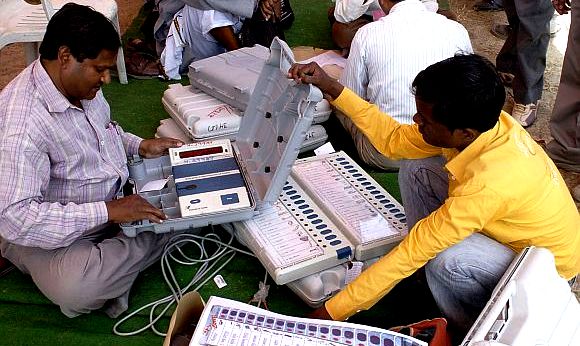By Vishal V. Sharma
Why Netherlands banned EVMs?
• “The government of the Netherlands has banned electronic voting machines from future elections because of a risk of eavesdropping. The nation will return to paper voting.” (Publication: Computer World, Dt: 19-05-2008, Author: Andreas Udo de Haes)
• Why? A secure voting machine cannot be guaranteed.
• Developing new equipment needs large investment, both financially and in organization. This offers insufficient value addition over voting by paper and pencil, “the Ministry of Internal Affairs said.
Why Ireland banned EVMs?
• In 2006, Ireland embarked on an e-voting scheme
• Prime Minister Bertie Ahern had said, it would dispense with “stupid old pencils”.
• Three years and €51 million later, the government scrapped the entire program.
• High costs were one concern—finishing the project would take another €28 million.
• There was a lack of trust. People just didn’t like that the machines would record their votes as mere electronic blips, with no physical record.
Why Germany banned EVMs?
• After almost two years of deliberations, Germany’s Supreme Court ruled in March 2009 that e-voting was unconstitutional.
• Why? Because the average citizen could not be expected to understand the exact steps involved in the recording and tallying of votes.
• Political scientist Joachim Wiesner and his son Ulrich, a physicist, filed the initial lawsuit to raise public awareness of the insecurity of electronic voting.
• Ulrich Wiesner said, the machines used in Germany are even less secure than mobile phones.
Why Italy banned EVMs?
• Italy announced that it would not pursue electronic voting any further.
• Italian Minister Giulano Amato stated, “We decided to stop the electronic voting machine. During the 2006 elections we experimented with the machines as a voting system, and not a system that counts the sections, without any reference to the legally valid votes.
• Further stating, “Let’s stick to voting and counting physically because less easy to falsify.”
(Source of info: http://www.jasonkitcat.com/h/f/JDOM/blog/1/?be_id=320)
What happened in Venezuela?
• Numerous electronic-voting inconsistencies have been reported in the developing countries.
• Unscrupulous governments often appear too eager to manipulate votes.
• After Hugo Chávez won the 2004 election in Venezuela, it came out that the government owned 28 percent of Bizta, the company that manufactured the voting machines.
• Similarly, the 2004 elections in India were notorious for gangs stuffing electronic ballot boxes in villages.
Why did a U.S. district judge refused permission for EVMs?
• In 2004, a district judge in Los Angeles upheld a partial state ban on electronic voting in the Nov. 2 election, denying a request by advocates for the disabled.
• Why? Software errors had prevented voting from opening on time, causing people to leave without voting.
• Machines weren’t federally approved.
• Certain security conditions were not met with.
(Source of info: http://www.wvcag.org/news/fair_use/2004/07_01e.htm)
Why did California ban EVMs?
• California Secretary of State Kevin Shelley banned EVMs in the November 2004 elections.
• Instead of calling for an outright ban of all EVMs, these machines could be recertified if they included: (i) a verifiable paper trail or a paper ballot option and (ii) certain security conditions are met. (Source of info: http://arstechnica.com/old/content/2004/05/3721.ars)
What does CIA say about electronic voting?
Central Intelligence Agency is America’s spy service. It is interesting to note what it has to say about EVMs.
• The CIA monitors foreign countries’ use of electronic voting systems.
• It reports apparent vote-rigging schemes in Venezuela, Macedonia and Ukraine and a raft of concerns about EVMs & tampering.
• A CIA cyber security expert Steve Stigall suggested before a U.S. Election Assistance Commission hearing in 2009 that Venezuelan President Hugo Chavez and his allies fixed a 2004 election recount.
• Stigall, studied electronic systems in about 36 countries, said that most countries’ machines produced paper receipts that voters then dropped into boxes. However, even that doesn’t prevent corruption.
(Source of info: http://www.mcclatchydc.com/226/story/64711.html)
Whats wrong with EVMs?
• What are the different steps in an EVM life-cycle?
• Development, installation, votes recording, data storage, and data transfer to a central repository
• Why are the machines so vulnerable?
• Each step in the life cycle of a voting machine involves different people gaining access to the machines, often installing new software.
• It wouldn’t be hard for, say, an election official to plant a “Trojan” program on one or many voting machines that would ensure one outcome or another, even before voters arrived at the stations.
Should India also ban EVMs?
• Speed of election results is obviously an attraction for the EVMs.
• But past precedence of ex-CECs having close post-retirement associations with the Congress party cannot be overlooked.
• Numerous EVM rigging allegations have been made by many prominent personalities.
• In 2001, Capt. Amarinder Singh, Punjab Pradesh Congress Committee alleged that EVMs can be tampered with. (Source of info: http://www.tribuneindia.com/2001/20010312/main4.htm)
• In 2009, Chandrababu Naidu blamed the EVMs for his defeat.
• In 2009, AIADMK urged the EC to revert back to paper ballots, saying that EVMs were rigged in Lok Sabha polls.
• Hon. Kerala High Court has asked EC to consider representation seeking changes in the EVMs.
• In 2004, the Hon. Supreme Court of India asked EC to consider suggestions on Prof. Satinath Choudhary and address issues concerning possible tampering of EVMs.
Conclusion
EVMs needed: Unlike the West, where EVMs are being discarded, India needs the EVMs.
Physical evidence: But additional security protocols like a physically verifiable paper printout by the EVM is needed.
Neutrality : EC neutrality is being damage by post- retirement associations of ex-CECs with a political party.
This needs to be stopped…..






















